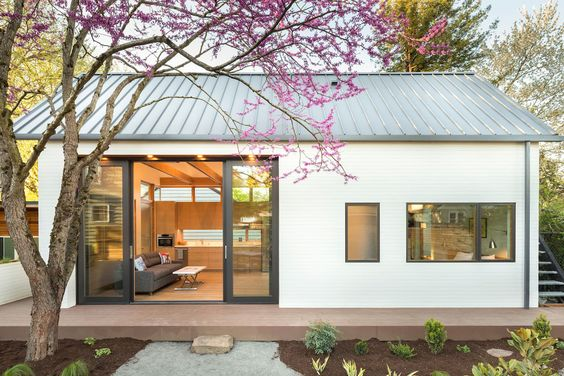With homes in scarce supply and the pandemic changing real estate choices, (ADUs) accessory dwelling units are becoming increasingly popular.
What exactly are auxiliary dwelling units (ADUs)? We don’t judge you if you’re considering constructing an auxiliary dwelling unit (ADU) on your land or purchasing a home that already has one. Having a separate residence in which to work, entertain visitors, and pursue hobbies is always a useful aspect to have at home. Here’s all you need to understand about ADUs and how to build one.


What exactly are ADUs?
So, what exactly are accessory housing units? Accessory housing units, sometimes known as “granny flats” and “mother-in-law homes,” are essentially second residences situated on the same land as a principal single-family house. An auxiliary dwelling unit might be a house over the garage, a modest cottage in the rear, or a basement residence. Regardless of its physical form (backyard cabin, basement residence, etc.), an ADU is legally part of the same domain as the main residence. It cannot be purchased or sold independently, like a condominium or a mobile home may. An ADU can be connected to or separate from the main house. In any case, it usually has its own entrance.
What Are Some of The Most Common Applications for an Accessory Dwelling Unit?
Having an extra housing unit on your property is beneficial in a variety of ways. ADUs are commonly used for the following purposes:
A mother-in-law residence – Do you intend to have an elderly parent live with you at some moment? One of the most typical reasons for having an ADU on your property is to use it as a separate mother-in-law residence. The ADU’s closeness to their principal residence enables convenient access to the relative while still providing some solitude and isolation.
A guest home — If your home has essentially become a motel for visitors, you may want to think about constructing a dedicated guest house on your land. A guest home will not only provide you with a location to lodge an overflow of friends and family, but it will also provide your loved ones with the seclusion they require.
A rental property – Renting out an auxiliary dwelling unit on your home is one of the finest methods to create a passive income stream. Having an ADU on your property allows you to generate additional money without lifting a finger, whether you’re searching for short-term renters (such as Airbnb guests) or long-term tenants with a contract.
A home workplace – Do you want to work from home? You may separate your work and home lives with an ADU on your land without having to suffer a long drive. Because of the seclusion and convenience of an ADU, many homeowners prefer to utilize it as a home office.
What Should I Think About Before Purchasing or Constructing an ADU?
Your requirements – Before constructing an ADU or purchasing a property with a second residence, consider your particular needs. Will you make good use of it? Is your house essentially a BnB with a revolving door of guests? Do you require the residence for a job or recreation? Do you intend to rent it? Before you make the expenditure, consider if you truly need an ADU. If you’re unsure how you’ll use it – or even if you’ll use it at all – it’s generally not something you should spend money on.
Your budget – Residences with ADUs are sometimes more expensive than homes without. Furthermore, constructing an auxiliary living unit will not be inexpensive. You should expect to spend a ton of money whether you’re refurbishing a basement or building a detached guest house. So, can you even afford it? Before investing in such a project, make sure to analyze all parts of your finances. Budget for every single item you intend to include in the unit including the best kitchen cabinets, doors, and hinges you will use.
Personal time and energy constraints – How much time and energy do you actually have to devote to creating an ADU or purchasing a home that already has an ADU? Building an ADU will take a significant amount of time and effort (think: designing, planning, and constructing). To get it all done, you’ll need to meet with your contracting company frequently. Owning a secondary residence on your primary property will also necessitate time and effort (think: upkeep and maintenance). If your life is simply too hectic to deal with the hassles of building or maintaining a second home, we don’t advocate embarking on such a large endeavor.
Conclusion
Over the previous decade, accessory housing units have surged in popularity. They may be a fantastic method for homeowners to improve the utility of their house while also adding significant value when it comes time to sell.
If you’re thinking of adding an ADU to your house or buying a multi-unit residence, it’s critical to make sure the project was properly sanctioned, otherwise, it might turn into a costly nightmare later on.
